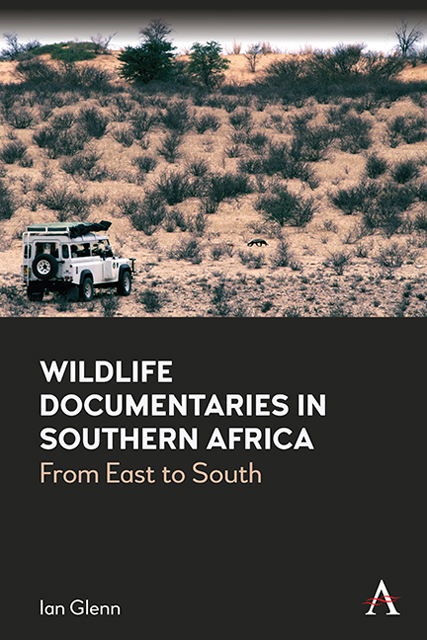Book contents
- Frontmatter
- Dedication
- Contents
- List of Figures
- Acknowledgements
- Introduction
- Chapter 1 What do the Critics Say?
- Chapter 2 A Theoretical Coalition?
- Chapter 3 Gone South: From East to Southern Africa
- Chapter 4 Private Lodges, Infrastructures and Guides
- Chapter 5 Going South: The Results
- Chapter 6 The Early History
- Chapter 7 The South Africans Enter the Game
- Chapter 8 Michael Rosenberg and Partridge Films
- Chapter 9 David and Carol Hughes
- Chapter 10 The Bartletts in the Namib, the Liversedges in Botswana
- Chapter 11 John Varty, Elmon Mhlongo and Londolozi
- Chapter 12 Richard Goss and Kim Wolhuter
- Chapter 13 Dereck and Beverly Joubert
- Chapter 14 Other Major Contributors
- Chapter 15 Going Live: Africam And Wildearth
- Chapter 16 Craig and Damon Foster
- Chapter 17 Must Love Animals?
- Chapter 18 The Social Turn
- Chapter 19 The Future of the Genre
- Chapter 20 The Influence of the Genre
- Conclusion
- Filmography
- Plates
- References
- Index
Chapter 10 - The Bartletts in the Namib, the Liversedges in Botswana
Published online by Cambridge University Press: 10 January 2023
- Frontmatter
- Dedication
- Contents
- List of Figures
- Acknowledgements
- Introduction
- Chapter 1 What do the Critics Say?
- Chapter 2 A Theoretical Coalition?
- Chapter 3 Gone South: From East to Southern Africa
- Chapter 4 Private Lodges, Infrastructures and Guides
- Chapter 5 Going South: The Results
- Chapter 6 The Early History
- Chapter 7 The South Africans Enter the Game
- Chapter 8 Michael Rosenberg and Partridge Films
- Chapter 9 David and Carol Hughes
- Chapter 10 The Bartletts in the Namib, the Liversedges in Botswana
- Chapter 11 John Varty, Elmon Mhlongo and Londolozi
- Chapter 12 Richard Goss and Kim Wolhuter
- Chapter 13 Dereck and Beverly Joubert
- Chapter 14 Other Major Contributors
- Chapter 15 Going Live: Africam And Wildearth
- Chapter 16 Craig and Damon Foster
- Chapter 17 Must Love Animals?
- Chapter 18 The Social Turn
- Chapter 19 The Future of the Genre
- Chapter 20 The Influence of the Genre
- Conclusion
- Filmography
- Plates
- References
- Index
Summary
‘On the contrary, I find that this prolonged attention to a single subject has the same result that prolonged attention to a senora has according to the authorities. All manner of favors drop from it. Only it requires a skill in the varying of the serenade […]’
–Wallace Stevens, letter to Harriet Monroe, 23 September 1922. Letters of Wallace Stevens, P. 230Introduction
As earlier chapters have shown, many filmmakers were drawn to the new possibilities offered by the scenery and wildlife in Namibia and Botswana. The Skeleton Coast, the Namib, Etosha, the Kalahari, the Okavango Delta and other Botswanan wildlife locations were firmly on the map as a result of earlier filmmakers and outsiders have continued to visit to make films. But three couples – Des and Jen Bartlett, Tim and June Liversedge, and Dereck and Beverly Joubert – who spent decades on home ground location have undoubtedly produced the most significant body of work in and on Namibia and Botswana. While the Okavango is fortunate to have had two such powerful teams as the Jouberts and Liversedges working there, my judgement is that the Jouberts were more innovative and Chapter 13 will examine the ways in which they benefited from their devotion to location.
As the quote from Wallace Stevens suggests, lengthy attention to a single subject often yields spectacular results: visually, ethologically, scientifically. While a visiting film crew, prompted by scientific work in the field, or drawing on other films, may come and record powerful scenes, it has usually been the locals who, through patience and time in the field, produce more holistically powerful and compelling narratives and original findings on animal behaviour. The Stevens poem also suggests the danger of repetition so analysis of these films will show the many ways – through new technologies, new camera possibilities, new focal points, new discoveries – in which these filmmakers tried to make it new.
Des and Jen Bartlett
Des and Jen Bartlett exemplify the move from East to Southern Africa and show why Southern Africa became the world’s most important locale for wildlife film from the 1970s on. Des Bartlett, born in Australia, was in many ways the founding figure of African wildlife documentary.
- Type
- Chapter
- Information
- Wildlife Documentaries in Southern AfricaFrom East to South, pp. 137 - 146Publisher: Anthem PressPrint publication year: 2022

